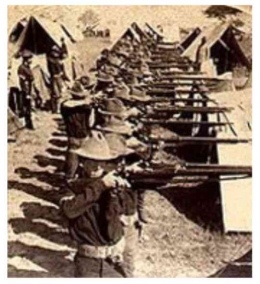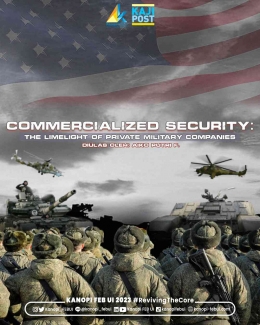By 2023, the private security sector alone in the United States is projected to expand to an industry worth $81 billion. People who possess a rare and expensive skill set that can only be obtained via military experience are drawn to a sector with higher risk and higher rewards.
On top of that, there's one more factor that's resurrecting mercenary groups: plausible deniability. This is the name of the game today about mercenaries, is that we live in an information age. In the information age, if you know information matters more than raw fire. If you want to wage war and get away with it, you wage it in secret; and for that you need plausible deniability. So if something bad happens or your operation goes sideways, you can totally disavow mercenaries. You cannot disavow your special operations troops or your own troops.
2018 witnessed this taking place. In eastern Syria, the Wagner group faced off against American Special Forces. That night, more Americans murdered Russians than on any other night during the Cold War. The reason it did not go to World War III is because both Moscow and Washington invoked plausible deniability. These are merely mercenaries, they both claimed. We do not need to escalate since they are not Russian soldiers.
War is changed in harmful ways by privatizing it:
Private conflict follows a distinct logic: Adam Smith, the inventor of economics, and Clausewitz collide. One of the main benefits of for-profit soldiers is that they are not constrained by political or nationalistic sentiments. Being market actors, they are primarily constrained by economic laws rather than the laws of war.
rivate war lowers the barriers to entry for war. Customers are exposed to moral hazard since mercenaries enable clients to engage in combat without putting their own blood on the line.
Due to its economic character, private war tends to become more intense. Clausewitz noted that the nature of absolute war is escalation; because it is motivated by the pursuit of profit, privatized conflict is an example of this. Mercenaries do not want to work themselves out of a job from the supply side. Instead, they are encouraged to start and prolong confrontations in order to make money.
Buyers who had not previously considered military action are now able to do so due to the availability of mercenaries on the demand side. In the past ten years, the world has already witnessed multinational corporations, governments, and millionaires hire mercenaries; this was not the case two decades ago. Private force availability reduces the entry barriers into armed conflict for those who can afford it, enticing greater violence.
By Aiko Putri Fauzi | Ilmu Ekonomi 2022 | Staff Divisi Kajian Kanopi FEB UI 2023
Bibliography
Abrahamsen, R., & Williams, M. C. (2008). Selling Security: Assessing the Impact of Military Privatization. Review of International Political Economy, 15(1), 131--146. https://www.jstor.org/stable/25261958








